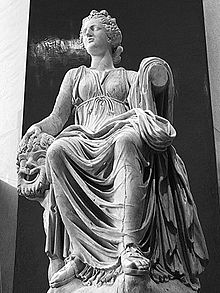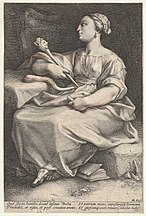| Thalia | |
|---|---|
Goddess of Comedy | |
| Member of the Muses | |
 | |
| Personal information | |
| Parents | Zeus and Mnemosyne |
| Siblings | Euterpe, Polyhymnia, Urania, Clio, Erato, Calliope, Terpsichore, Melpomene and several paternal half-siblings |
| Consort | Apollo |
| Children | the Corybantes |

In Greek mythology, Thalia (/θəˈlaɪə/[1][2] or /ˈθeɪliə/;[3] Ancient Greek: Θάλεια; "the joyous, the flourishing", from Ancient Greek: θάλλειν, thállein; "to flourish, to be verdant"), also spelled Thaleia, was one of the Muses, the goddess who presided over comedy and idyllic poetry. In this context her name means "flourishing", because the praises in her songs flourish through time.[4]
Appearance[edit]
Thalia was portrayed as a young woman with a joyous air, crowned with ivy, wearing boots and holding a comic mask in her hand. Many of her statues also hold a bugle and a trumpet, or occasionally a shepherd's staff or a wreath of ivy.
Family[edit]
Thalia was the daughter of Zeus and Mnemosyne, the eighth-born of the nine Muses. According to Apollodorus, she and Apollo were the parents of the Corybantes.[5]
Gallery[edit]
-
"David Garrick between Tragedy and Comedy" by Joshua Reynolds (1760). Thalia is pictured left, and Melpomene to the right
-
Engraving by Hendrick Goltzius (1558–1617)
-
Portrait of Françoise-Marie-Jeanne Picquefeu de Longpré, as Thalia, Muse of Comedy Louis-Michel van Loo (1765–1766)
-
(1739)
See also[edit]
Notes[edit]
- ^ "Thalia". Oxford English Dictionary (Online ed.). Oxford University Press. (Subscription or participating institution membership required.)
- ^ "Thalia Definition & Meaning - Merriam-Webster".
- ^ "Home : Oxford English Dictionary".
- ^ "Thalia | Greek mythology | Britannica". www.britannica.com. Retrieved 2022-10-26.
- ^ Apollodorus, 1.3.4. Other ancient sources, however, gave the Corybantes different parents (see Frazer, n. 2 on 1.3.4).
References[edit]
- Apollodorus, Apollodorus, The Library, with an English Translation by Sir James George Frazer, F.B.A., F.R.S. in 2 Volumes, Cambridge, Massachusetts, Harvard University Press; London, William Heinemann Ltd., 1921. ISBN 0-674-99135-4. Online version at the Perseus Digital Library.
- Grimal, Pierre, The Dictionary of Classical Mythology, Wiley-Blackwell, 1996, ISBN 978-0-631-20102-1. "Thalia" 1. p. 442.
- Smith, William; Dictionary of Greek and Roman Biography and Mythology, London (1873). "Thaleia" 1.
External links[edit]
 Media related to Thalia at Wikimedia Commons
Media related to Thalia at Wikimedia Commons- Warburg Institute Iconographic Database



